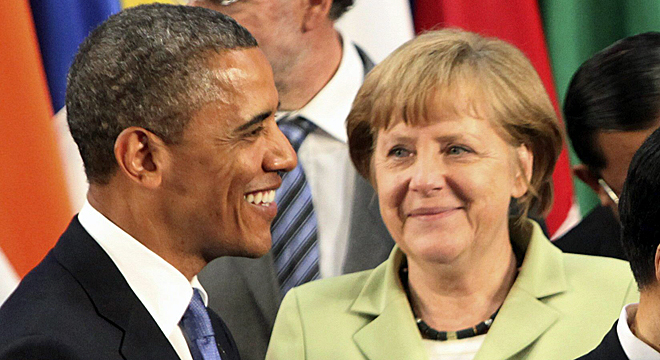Patrick Wintour | The Guardian
Angela Merkel is poised to allow the eurozone’s â¬750bn bailout fund to buy up the bonds of crisis-hit governments in a desperate effort to drive down borrowing costs for Spain and Italy and prevent the single currency from imploding.
Germany has long opposed allowing the eurozone’s rescue fund, the European Financial Stability Facility, to lend directly to troubled eurozone countries, fearing that Berlin would end up paying the bill, and the beneficiaries would escape the strict conditions imposed on Greece, Portugal and Ireland.
But Merkel has come under intense pressure as financial markets have pushed up borrowing costs for Spain to levels that many analysts see as unsustainable.
Analysts are likely to see the decision as the first step towards sharing the burden of troubled countries’ debts across the single currency’s 17 members, though it falls short of the “eurobonds” proposed by the European commission president José Manuel Barroso.
The proposal was discussed on the margins of the two-day G20 summit in Los Cabos, Mexico, which has been dominated by the depressing impact of the eurozone crisis on the world economy.
G20 officials believe an announcement could be made by the leaders of the eurozone in the next few days, but stressed they remained unclear as to timing and precise content.
It would be the first time the EU bailout funds have been used directly to purchase Spanish debt. It is understood the money would come from both the â¬500m European Stability Mechanism and its predecessor, the â¬250m European Financial Stability Facility.
Britain does not contribute to either fund.
Last week EU leaders had agreed a line of credit to Spanish banks through the Spanish government, a move that failed to reduce Spanish bond yields.
The ECB purchased â¬210bn of mainly Greek bonds in 2010, but its involvement was stopped partly because of German opposition. This would be the first time the two bailout funds were used in this way.
The funds had been set up to bail out peripheral countries such as Ireland and Portugal, and there will be concern whether the funds have sufficient firepower to help large economies.
The German agreement to sanction the move was relayed at a meeting between Barack Obama and Merkel on Monday. The move initially prompted the US president to agree to cancel a further meeting of the eurozone leaders scheduled for late on Monday night.
François Hollande, the French president, said the meeting between the eurozone and Obama had been rescheduled for this morning to brief the Americans on “mechanisms that allow us to fight speculation”.
The private discussions at the G20 have focused repeatedly on the eurozone crisis, and leaders recognise that one summit is not going to fix the crisis.
British ministers were pleased the G20 communique is specific on its commitments to try to find a mechanism to address unsustainable bonds costs.
Ministers have been struck that within the eurozone there is a realisation that even with the Spanish banks’ recapitalisation and a Greek election endorsing its previous bailout agreement, more needs to be done to address unsustainable bond yields.
There were renewed signs that the fiscal crisis was intensifying on Tuesday after the Spanish government announced it would delay spelling out the full results of the independent audit of its crisis-hit banks until September.
Madrid was granted a â¬100bn bailout from its European partners earlier this month to shore up its financial sector. But news that the full extent of the shortfall of the banks will not be known until the autumn underlined the sense of chaos.
There was speculation that the full total required could end up being far more than â¬100bn. Madrid was forced to pay a record 5.7% at a debt auction on Tuesday morning to borrow â¬2.4bn for just 12 months, prompting analysts to say Spain is edging perilously close to needing a full-blown rescue.
“The decidedly elevated bond yield levels leave a question mark firmly in place as regards the sustainability of Spain’s public finances while doing nothing to temper speculation as to how long the country might hold out before looking for a more comprehensive bailout,” said Richard McGuire of Rabobank.
British government sources were stressing that any steps taken to help on Spanish bond yields were not a substitute for longer-term reforms such as European banking union, fiscal integration and even political union.
The chancellor, George Osborne, hinted at the possible deal saying the eurozone was inching towards solutions. He said: “I think there are signs that the eurozone are moving towards richer countries standing behind their banks and standing behind the weaker countries.
“There is no doubt that they [the eurozone] realise that individual measures taken in individual countries – like recapitalising Spanish banks and getting a Greek government that is in favour of staying in the euro – are not by themselves enough”
The G20 communique due to be issued later mentions “steps towards greater fiscal and economic integration that lead to sustainable borrowing costs”.
British officials are pleased that the lengthy passage on the eurozone makes specific forward-looking references to improving the functioning of financial markets and breaking the feedback loop between sovereigns and banks.
It also speaks of the need for a more integrated financial architecture encompassing banking supervision and recapitalisation and deposit insurance.
The Guardian is an independent, global news organisation that invests in original journalism and in-depth analysis. For more from the Guardian, visit http://www.guardiannews.com. © 2011 Guardian News And Media Limited.







